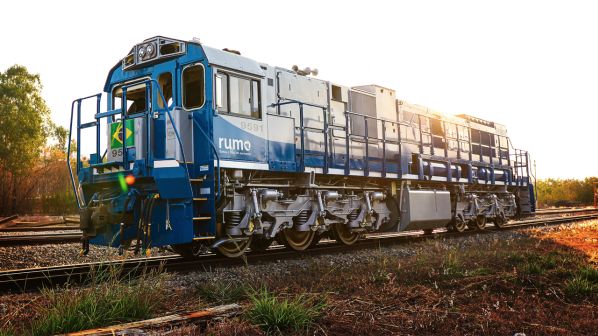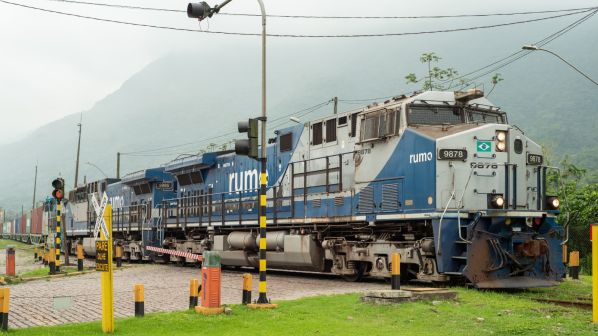PROGRESS Rail has delivered two EMD GT38H diesel-battery-electric hybrid locomotives to Rumo Logistics, Brazil’s largest freight operator.
The GT38H, a member of Progress Rail’s Joule series, is an intermediate-power, Co-Co locomotive powered by a Caterpillar 3512 diesel engine paired with a generator and a lithium-ion battery bank. Rumo placed the order in September 2022.
A six-month testing programme will commence this month on Rumo’s narrow-gauge South Network between Guarapuava and Desvio Ribas in Brazil’s Ponta Grossa region. The test area was selected because of its mountainous terrain requiring locomotives capable of negotiating sharp curves, according to Rumo’s manager of digital projects and innovation, Mr Rodrigo Rampinelli. The two GT38Hs will haul the same tonnage as six conventional diesel-electric locomotives, at higher speeds.
The first hybrid locomotive to be deployed in revenue freight service, the 60km/h, 2.2MW GT38H is capable of both regenerative and external battery charging. The locomotive has a starting tractive effort of 495kN and continuous tractive effort is 402kN. The battery capacity is 550kWh while the regenerative braking effort is 251kN.
Rumo estimates the GT38H “will be more fuel efficient than diesel-electric units currently in operation, and the use of batteries as an energy source could add improved savings.” The freight operator predicts total fuel savings of up to 45%, and significant reductions in particulate matter and NOx emissions, plus noise reduction.
“With this technology on our network, we will be able to evaluate the performance of the unit, considering the characteristics of the track,” says Rumo director of maintenance, Mr Marcus Jorge. “This is an important step in analysing the feasibility of expanding the use of hybrid locomotives in our fleet.
“We are optimistic about this project and the technological advances this locomotive represents in relation to reducing emissions and improving safety. In addition, these locomotives represent a step forward for new technology to be developed, with a focus on broad-gauge and higher-density operations as we have in our North Network, the main rail corridor between Rondonópolis and the port of Santos.”


